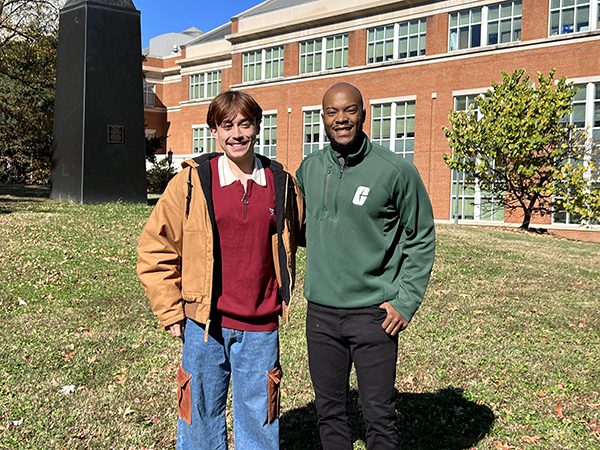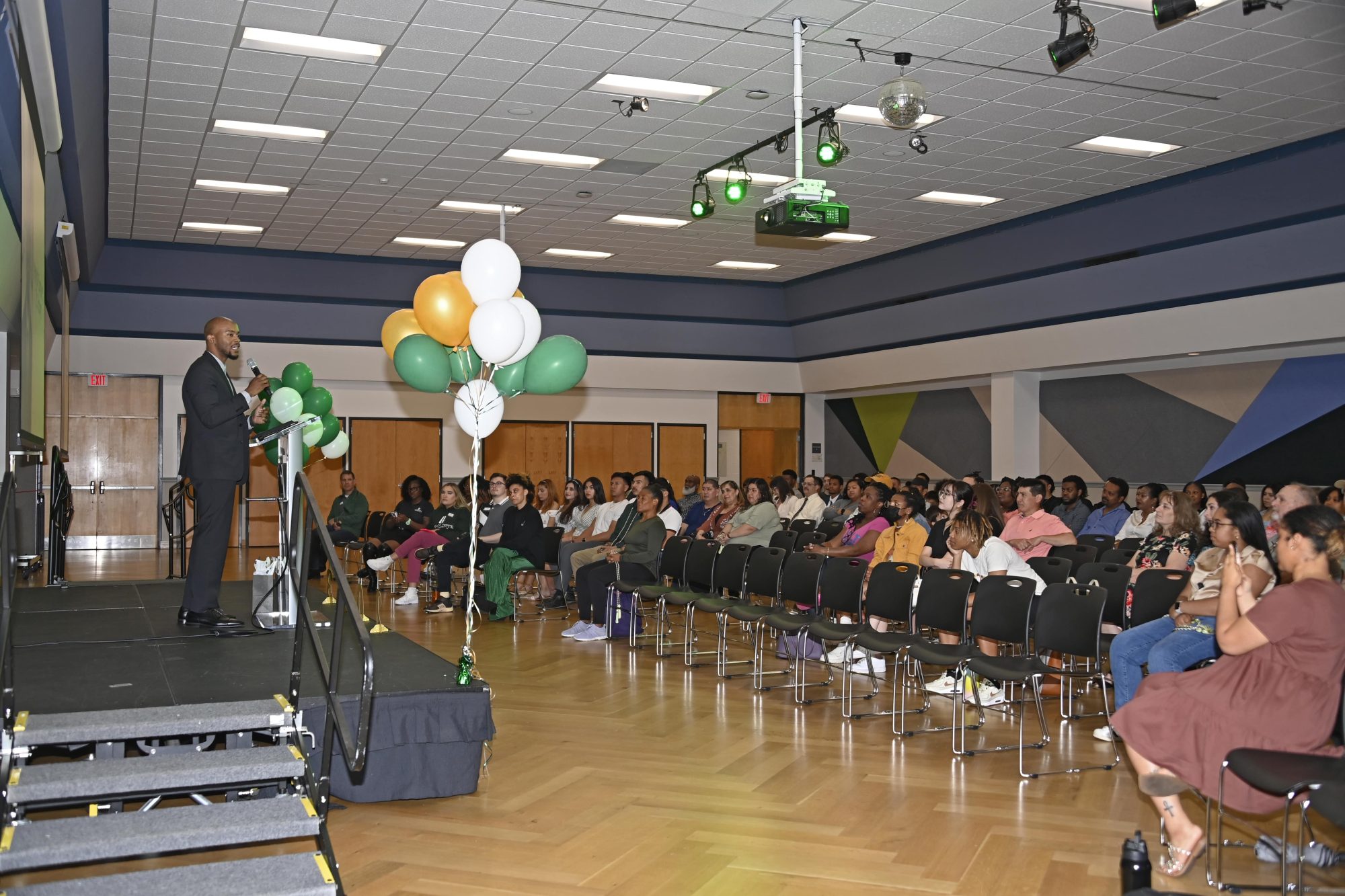Meet First Gen Niners

First-generation Niners, or students who are the first in their families to attend college, make up a large percentage of UNC Charlotte’s population. This week is First-Generation Celebration Week, so take the opportunity to learn more about two first-generation individuals, Lorenzo Hopper, assistant professor in public health sciences and faculty advisor of the First Gen Niners student organization, and Mark Mistretta, a senior majoring in biology and interdisciplinary studies (health and medical humanities), a biology honors student and president of the First Gen Niners student organization.
Describe your first-generation experience.
Lorenzo Hopper: I would describe my first-generation experience as a transformative journey filled with amazing peaks and some very difficult valleys. As a first-generation college student, I carried the pressures to make my family proud and maintain my high-achieving academic record. Moving from rural Shelby, North Carolina, to the campus of UNC Chapel Hill was quite a change of both my learning and living environment. Socially, it was wonderful! I began to meet new people and build new friendships. Academically, I really struggled to adjust. I wasn’t aware at the time that I lacked the guidance and resources that would have helped me to understand the rigors of college. In my first semester, I failed my first chemistry and calculus exams. Suddenly, I started to question everything about my academic ability. I was lucky enough to meet the right mentors at the right time. Through this journey, I learned to reflect often on my performance and collect tools or insights on how to seek peer support, mentorship and opportunities to learn what resources were helping my peers. I continue these practices now as an assistant professor at UNC Charlotte.
Mark Mistretta: My first-generation journey has been a personal rollercoaster of emotions. Each step, from applying to college to tackling the FAFSA and registering for classes, brought a mix of excitement and anxiety. At times, I found myself questioning, “Am I doing this right?” The weight of being a first-generation student and carrying the hopes of my family, created a sense of responsibility that occasionally led to imposter syndrome. But, I’ve learned to find my place and take pride in my achievements, understanding that I do truly belong here. This journey has allowed me to make friends I never knew I’d meet, from computer engineers to aspiring nurses, which has enriched my college experience. The first-generation community and mentors, like Dr. Hopper, have been a personal wellspring of inspiration. They’ve shown me that I, too, can become a respected professional in my chosen field. Throughout this journey, I’ve also discovered the importance of seeking support and lifting both myself and those around me. I’ve witnessed firsthand the strength that comes from a supportive network and how we can all grow and thrive by just helping one another. The challenges I’ve faced have only deepened my personal determination, making this journey all the more rewarding with a world of possibilities ahead.
How did it feel or will it feel to be the first in your family to earn a college degree? What does/did that mean for you and your family?
Lorenzo Hopper: Being one of the first in my family to graduate college holds immense significance both to me and my family! I was filled with pride to wear that cap and gown and walk the stage as a graduate. My entire family gathered in Chapel Hill. We celebrated, and I felt like I was on top of the world. I was a bit relieved, too, if I am honest. I carried a lot of pressure to reach that milestone. Today, I am able to show my family firsthand what some of the benefits of pursuing a higher level of education can afford you. My nephews are on campus quite often. For them, I hope that the idea of going to college seems much more like a real possibility.
Mark Mistretta: Earning a college degree, as the first in my family to do so, is an incredibly meaningful achievement. It represents not only my personal dedication but also the fulfillment of my family’s hopes and dreams. My mother’s journey from Colombia to the United States was a profound sacrifice, motivated by the pursuit of better opportunities for both her and me. Witnessing her determination and enduring support has made this educational journey all the more worthwhile. I feel a deep sense of gratitude for the chance to pursue higher education, a dream that many aspire to but not all can attain. Connecting with my family, especially when I call back home and hearing the pride in their voices, is a powerful reminder of the impact this accomplishment has on all of us.
Aside from your own experiences as one, what excites you about leading other first-generation students? 
Lorenzo Hopper: I get so excited about the possibility of helping our First Gen Niners reach their goals and full potential. I also get excited to see the students and families at our new graduation celebration event. I had the opportunity to serve as the keynote speaker at our inaugural event in the spring, and it was absolutely amazing! Our First Gen Niners are trailblazers and when they are adequately supported, first-generation college students can make substantial contributions to a university’s growth, diversity and success. This is just one way that I hope to make an impact in our campus community.
Mark Mistretta: What excites me most about leading other first-generation students is the opportunity to explore the diverse stories and backgrounds they bring to the table. Each person’s distinctive journey, challenges and goals are fascinating and offer valuable insight. Equally inspiring is the chance to learn from others, as I believe there is wisdom in every individual’s experience, and this collective knowledge can enrich our shared journey. Witnessing their accomplishments reinforces the idea that success is attainable for all. As a leader, I represent my fellow first-generation students by showing that they can overcome anything and blaze their unique path. Engaging with this diverse group allows me to create an inclusive and supportive community where we can celebrate our shared accomplishments and empower one another to turn our dreams into reality.
Professor Hopper, how did it help you get to where you are today? Mark, how do you think being a first-generation student will equip you for the future?
Lorenzo Hopper: As I grew older, I started to really embrace this part of my identity, and I was able to use it to my advantage. As I mentioned, being a first-generation student really challenged me to figure it out and seek help when I needed it. I call the resources that helped me “tools.” The more tools you have in your toolbox, the more prepared you are for any job that comes your way. I used those tools to help me through my master’s and doctoral degrees. I still use them today in my role as a researcher and educator.
Mark Mistretta: As a first-generation student, I’ve learned the value of hard work and perseverance through navigating challenges and limited resources. My experiences have nurtured deep empathy for underserved communities, inspiring me to seek innovative solutions. The desire to make my family and supporters proud fuels my dedication to excellence and pushes me to uplift my community as a testament to what can be achieved. This inherent drive to give back motivates me to mentor and support others on their journey, creating a network of shared successes. This will prompt me to reach my full potential and continue making a difference.
What piece of advice would you give to others who are the first in their family to attend college?
Lorenzo Hopper: I have three pieces of advice to offer our First Gen Niners. First, find your community here on campus. When we started the First Gen Niners student organization, we wanted to create a safe space and engage students to help them stay connected to the University and thrive despite the academic stressors and challenges that the pandemic created. Next, I would say get out and volunteer either on campus or in the community. Volunteerism can have a real significant impact on your growth and success, both academically and personally. Finally, I would say, “Enjoy the journey.” Appreciate and find fulfillment in the process. Embrace the highs, the lows and the in-betweens of your academic journey.
Mark Mistretta: Embracing your unique journey as a first-generation college student will be transformative. You’ll realize that the strength gained from overcoming obstacles is a powerful asset, shaping your academic and professional journey. Seek guidance from mentors and advisors; they provide essential support and access to valuable resources. Don’t underestimate the importance of finding your community and place within the college environment. This will offer a sense of belonging, drive personal growth and help you discover more about yourself. Stay committed to your goals, persevere through challenges and remember that your education is an investment in your future success.
Why should other first-generation students join the First Gen Niners student organization?
Lorenzo Hopper: Join First Gen Niners, and lift your voice. I’ve learned from my time at different institutions that students can make real change when they come together and demand action. First Gen Niners is a student organization that is just getting started. With more voices at the table, we can all learn how to better celebrate and support you as students.
Mark Mistretta: First-generation students should consider becoming part of First Gen Niners to foster mutual support and reinforce our community on campus. By joining forces with fellow first-generation students, we can pool our stories, bright minds and open hearts to create a robust support network that benefits not only ourselves but also those who will follow in our footsteps. We warmly invite non-first-generation students and faculty to participate in this initiative as well. Their unique perspectives on the college experience and their ability to offer guidance can be incredibly valuable in supporting our members in ways that may not be readily accessible to first-generation students. Together, we can build a stronger and more inclusive campus community.
How can other students, faculty and staff get involved to support first-generation students?
Lorenzo Hopper: First Gen Niners is a student organization for first-generation students, and we are looking for faculty and staff who are interested in helping by being mentors or volunteering for some events. If you would be interested you can email me directly (lhopper6@charlotte.edu) or fill out this Google form and once events become available we will reach out to you.
Mark Mistretta: Supporting events like our annual First Generation Celebration Week is crucial for recognizing first-generation student achievements and building a sense of community. Encouraging greater involvement in organizations like First Gen Niners, from students, faculty and staff, can enhance their support networks. Providing first-generation students with mentorship programs, advice and scholarships are vital for promoting inclusivity and eliminating barriers to higher education. I’ve personally witnessed the impact of offering campus tours to many first-generation high school students, and their enthusiasm for pursuing higher education is truly inspiring. These students have the potential but often require guidance to achieve their goals. Expanding such initiatives and creating more pathways for these students to access college and succeed once they arrive can make higher education a tangible reality for those who aspire to it.